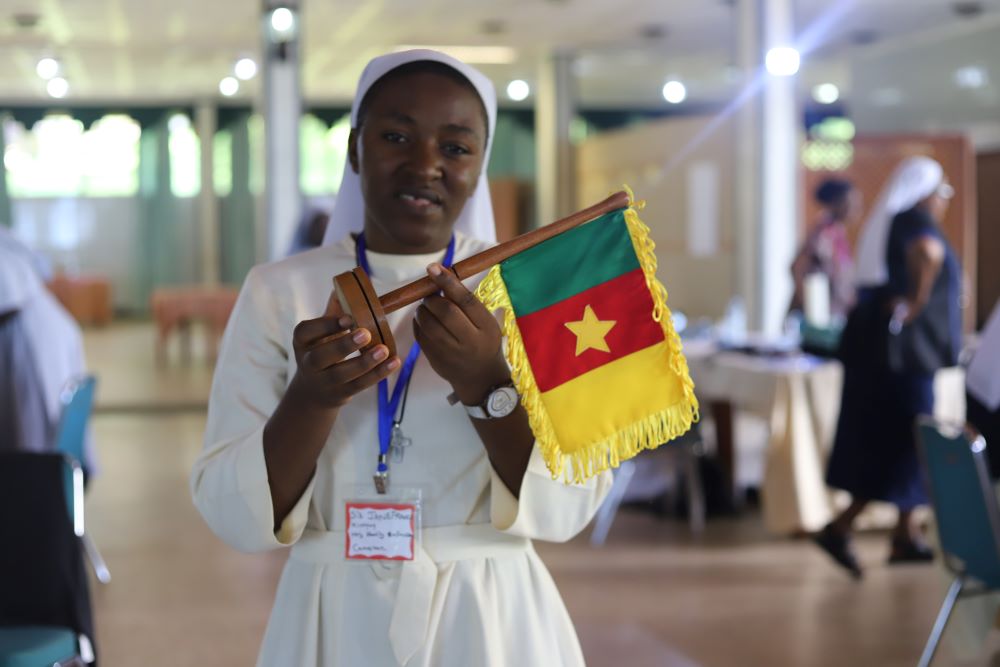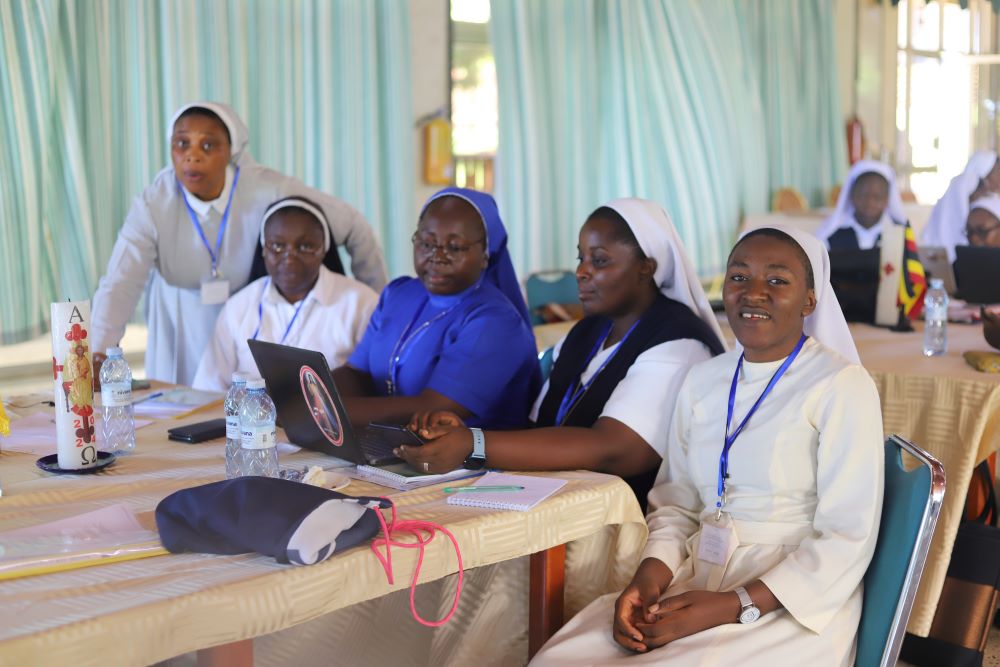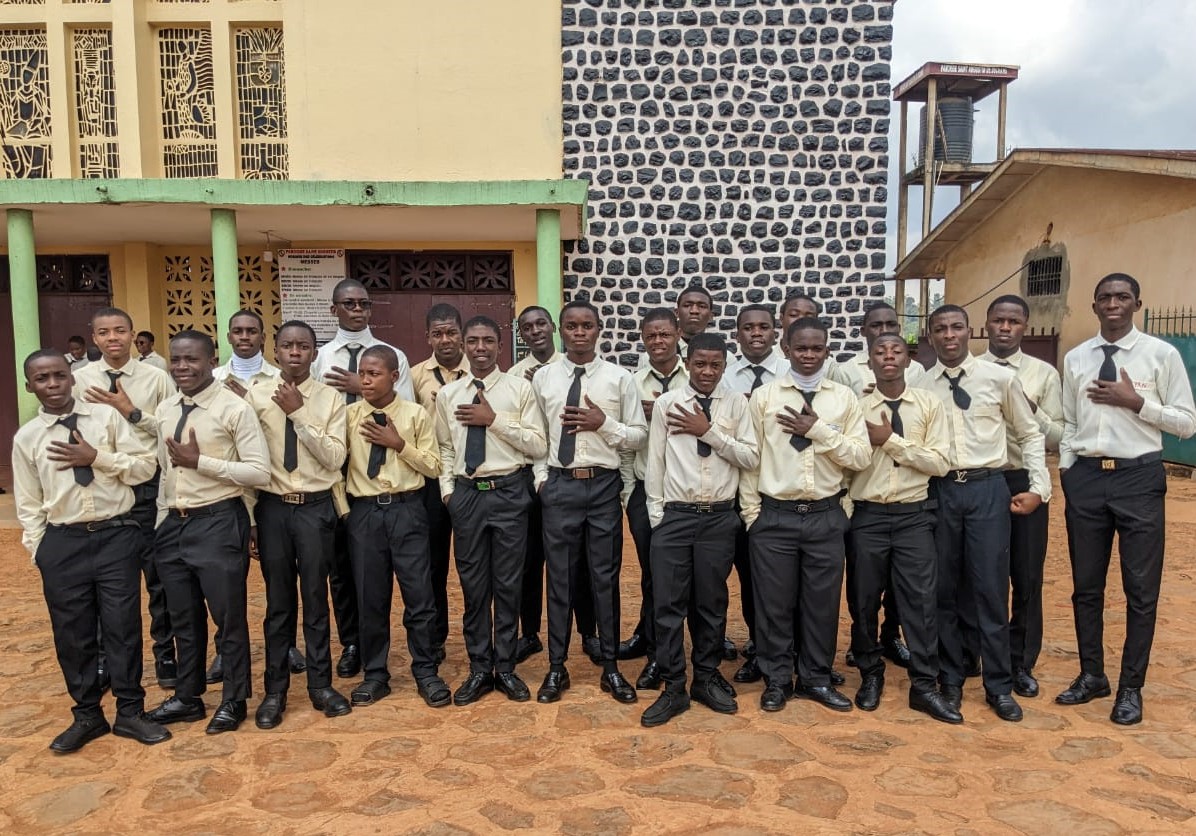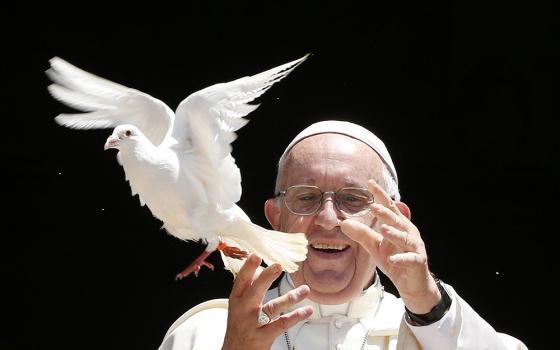
Sr. Janefrancis Kinyuy, a member of the Daughters of the Holy Family of Bafoussam, holds the flag of Cameroon during the All-Africa Conference: Sister to Sister convening in Entebbe, Uganda, April 10. (GSR photo/Doreen Ajiambo)
As the central African country grapples with the devastating effects of the Anglophone Crisis, Sr. Janefrancis Kinyuy is defying all odds to provide education and a home to hundreds of displaced and orphaned children in this northwest town, 350 miles from Yaoundé, the country's capital.
The Anglophone Crisis, also known as the Ambazonia War or the Cameroonian Civil War, is an ongoing civil war that started in October 2016 between Cameroonian state and Anglophone separatists. The crisis began when the Anglophones, who comprise 20% of the country's population of more than 30 million people, complained of political and economic marginalization at the hands of the Francophone majority government since independence in 1960.
The teachers, lawyers and students from the Anglophone population, most of whom live in the country's northwest and southwest regions, protested, demanding educational and judicial system reforms. They called for the inclusion of English and French in the government's service delivery and institutions, as stated in the country's constitution. The government used force against the protesters, leading to the full-blown outbreak of armed conflict, violence and radicalization among the Anglophone speakers.
According to the International Crisis Group report, the struggle has killed more than 6,000 people, displaced 765,000 people and left 2.2 million people from English-speaking regions in need of humanitarian support. The latest report United Nations Children's Fund, or UNICEF, shows that the ban on education imposed by Anglophone separatists in the northwest and southwest regions has affected more than 600,000 children. The militia groups have attacked, kidnapped, threatened and killed teachers and students who dare to go to school.
However, amid the ongoing civil war and political strife, Kinyuy struggles to balance keeping children safe, providing education and being the hope needed for society despite the challenges.
"We are facing tough and uncertain times in this country. There is extreme suffering and loss of life. All of us are paying the price of this ongoing war by going through hardships, especially children who are being denied education," said Kinyuy, a member of the Daughters of the Holy Family of Bafoussam
"With each passing day, the conflict keeps growing, and people are always running away from their homes to look for safety, so they come to us for shelter and security, especially the children."

Sr. Janefrancis Kinyuy, a member of the Daughters of the Holy Family of Bafoussam, is pictured with other sisters at the Imperial Botanical Beach Hotel during the All-Africa Conference: Sister to Sister convening in Entebbe, Uganda, April 10. (GSR photo/Doreen Ajiambo)
GSR: Tell us about yourself and the work you do.
Kinyuy: I am (32) years old and have six years of religious life in our congregation. I am the vice principal of St. Paul's English Catholic College Dschang, where we take care of the internally displaced children from the northwest and southwest regions of the country because of the country's sociopolitical crisis, and I mentor those children (that is, like their mother). It is not easy because there is a lack of means to cater to these children. At the same time, I am a professional teacher and have been teaching at St. Paul's English Catholic College Dchang for two years.
St. Paul's English Catholic College Dschang provides primary and secondary education to children orphaned and displaced as a result of the ongoing civil war. We are planning to start tertiary education in the future to help these children succeed in their lives.
Our congregation opened the institution in 2009 to meet the community's education needs. The region had only two schools during that time, although children did not attend school that much. Therefore, our school was built with the capacity to accommodate a small number of students who were interested in learning. The number the school could accommodate was 450 students.
However, when the civil war started in 2016, the number doubled from 450 to over 1,000 students because the majority of children turned to the school as the only safe place they could stay since the armed groups and security forces rarely attack missionary schools and institutions.
The majority of internally displaced children in this region live in our institution, and we offer them accommodation. We also cater to the psychological aspect of these children. Most of these children are traumatized by the time they come here. The majority of them witnessed the deaths of their parents and family members. So, I offer them guidance and counseling, educate and feed them, and ensure they feel comfortable.

Students of St. Paul's English Catholic College Dschang are pictured outside their school compound in Dschang, a town in the northwestern region of Cameroon. Sr. Janefrancis Kinyuy is vice principal of the school, which provides primary and secondary education to children orphaned and displaced as a result of the ongoing civil war. (Courtesy of Janefrancis Kinyuy)
What are some of the challenges?
We already have insufficient resources, and we have to help these children who have been displaced and are suffering.
We also have a problem with diseases in these areas, like malaria, HIV/AIDS and typhoid. Some of the children here are dying randomly because of a lack of good health care and medical attention. Some parents are too poor to care for their children, and they are forced to abandon them without care, forcing these children to seek our help.
Being a religious sister in this region is also a challenge because the expectations from locals are too high to achieve. Most people expect us to have a solution to every problem they face, and we are helpless.
Another challenge is feeding children seeking shelter at our institution and providing them with water, medical, education, clothes and other basic needs. For example, the water point is very far away in this place. You have to travel about 45 kilometers on foot under the hot sun to have water. From the same well, we also use it for drinking, which is very unhygienic, but then we have no choice because we can only use what we have.
We also have a problem with congestion since the dormitory capacity is small, and the number of children seeking shelter is enormous. Sometimes, we are forced to host some of the parents and students in our convent.
Advertisement
How does the Holy Spirit work in your ministry?
I feel that the Holy Spirit is undoubtedly working in my ministry because despite the challenges we go through as sisters in this region, there is still success, and I thank God for it.
The students in our institutions are healthy and doing well in their education despite the limitations. Sometimes, I also get people who come in with donations to help these children. Once in a while, community members give us food to feed these children, too, which I continue to appreciate and give thanks to God. This is the work of the Holy Spirit!
Many of these children are alive today despite going through stress and trauma after losing their parents and members of their family due to the ongoing civil war. This is a miracle, and it makes me feel that the Holy Spirit is working in these children’s lives.
Taking care of these children despite their different family backgrounds and different characters and being able to live together with love at the institution is a blessing. Furthermore, having good health and wisdom to care for these children whom God has entrusted under my care is a gift of the Holy Spirit.
Finally, since we are a religious institution, we turn to God for everything. I always try to organize masses for these children. By praying the novena prayer, we get consolation and hope for a solution to the ongoing crisis.
What are the successes?
The patience and courage we get from the sisters at this institution is our biggest success and encouragement. Sleeping with our challenges and waking up to solve one problem at a time is a significant breakthrough because you have to smile. The smiling faces of the children we help are a great source of joy in my heart, and to make a child smile is success on its own. Despite the sisters' suffering, team spirit and collaboration from them is like living the Gospel of Christ, which is what I call my mission.







